Venezuela’s Guaido declares himself president amid protests
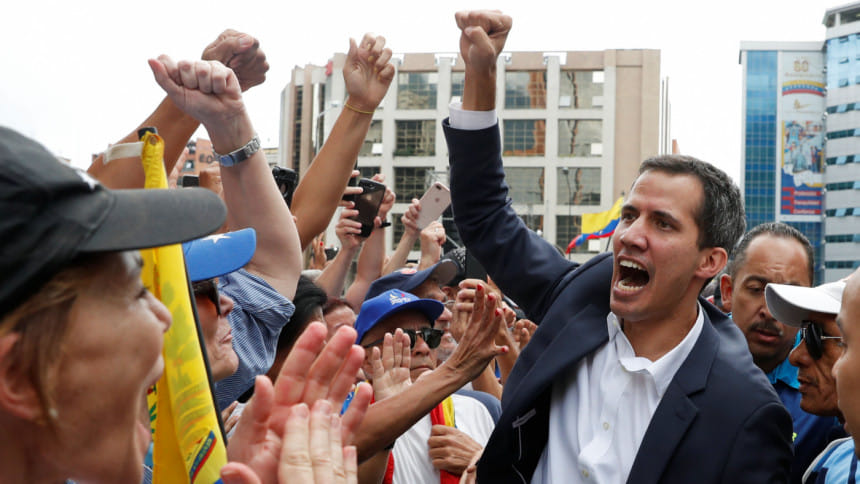
Venezuelan opposition leader Juan Guaido has declared himself interim president in a defiant speech before masses of anti-government demonstrators who took to the streets Wednesday to demand President Nicolas Maduro’s resignation.
He immediately drew recognition from the Trump administration, which said it would use the “full weight” of US economic and diplomatic power to push for the restoration of Venezuela’s democracy.
Raising his right hand in unison with tens of thousands of supporters, the head of the opposition-controlled congress took a symbolic oath before God to assume executive powers he says are his right under Venezuela’s constitution and take over the presidency until new elections can be called.
Guaido said he was taking the politically risky step just two weeks after Maduro took his own oath to a second, six-year term confident that it was the only way to rescue Venezuela from “dictatorship” and restore constitutional order
“We know that this will have consequences,” Guaido, 35, told the cheering crowd standing before a lectern emblazoned with Venezuela’s national coat of arms.
“To be able to achieve this task and to re-establish the constitution we need the agreement of all Venezuelans,” he shouted.
The declaration came as tens of thousands of anti-government demonstrators poured into the streets Wednesday accusing embattled Maduro of usurping power and demand he step down as the country reels from a crushing economic crisis forcing millions to flee or go hungry.
Large crowds of protesters gathered in Caracas waving flags and chanting “Get out Maduro!” in what was the largest demonstration since a wave of unrest that left more than 120 dead in 2017.
Pro-government demonstrators dressed in red in support of Maduro were also marching in the capital, at times crossing paths with opposition protesters and shouting “sell outs” and “traitors.” National guardsmen launched tear gas at anti-government protesters in the middle-class neighborhood of El Paraiso but for the most part the marches continued without conflict.
“Join us!” the protesters cried out to a line of officers wearing helmets and carrying shields. “You are also living this crisis!”
The protest is considered a crucial test for the reinvigorated opposition as it seeks to send a forceful message that Maduro no longer has the people’s backing and appeals to the military and the poor to shift loyalties that until recently looked solidly behind the president. The protests were called to coincide with an historic date for Venezuelans — the anniversary of the 1958 coup that overthrew military dictator Marcos Perez Jimenez.
“The democratic forces are here advancing,” opposition leader Maria Corina Machado said as she marched. “Not so that Maduro changes but so that he leaves.”
President Donald J. Trump in a statement called on other Western hemisphere governments to join him in recognizing Guaido.
“The people of Venezuela have courageously spoken out against Maduro and his regime and demanded freedom and the rule of law,” Trump said.
The demonstration comes after a whirlwind week that saw an uprising by a tiny military unit put down by government forces, fires set during protests in poor neighborhoods and the brief detention by security forces of Guaido, the newly installed head of the opposition-controlled congress.
Over the last two nights, Venezuelans angry over their country’s spiraling hyperinflation, and food and medical shortages have gathered in the streets banging pots and pans and setting up barricades in protest. In the city of San Felix, residents set fire to a statue of Maduro’s mentor and predecessor, the late Hugo Chavez.
In the southern city of Ciudad Bolivar, a 30-year-old worker, Carlos Olivares, was killed when four unidentified men descended from a beige Jeep and fired upon a crowd that was looting a store. Two more unidentified people were also killed, according to a police report of the incident, while two were injured.
For much of the past two years, following a deadly crackdown on the 2017 protests and the failure of negotiations ahead of last May’s boycotted presidential election, the coalition of opposition parties has been badly divided over strategy and other differences as millions of desperate Venezuelans fled the country’s hyperinflation and widespread food shortages. But buoyed by unprecedented international criticism of Maduro, anti-government forces have put aside their infighting and are projecting a united front.
Guaido, who is taking the reins from a long list of better-known predecessors who have been exiled, outlawed or jailed, was dragged from an SUV just over a week ago by intelligence agents but was quickly released amid an international outcry.
In the run-up to Wednesday’s protests, the defiant young lawmaker crisscrossed Caracas attending outdoor assemblies known as “Open Cabildos” — for the revolutionary citizen councils held against Spanish colonial rule — pumping up crowds by arguing that Maduro must go for democracy to be restored.
“We are tired of this disaster,” he said Monday from the roof of a college building. “We know this isn’t a fight of a single day but one that requires lots of resistance.”
An enthusiastic crowd of students answered with shouts of “Freedom!”
Driving the crisis was Maduro’s decision to ignore international opposition and take the presidential oath on Jan. 10 for a second term widely considered illegitimate after his main opponents were banned from running against him.
Guaido has been targeting his message to Venezuela’s military, the traditional arbiter of political disputes.
Maduro, who lacks the military pedigree of his mentor, Chavez, has sought to shore up support from the armed forces by doling out key posts to top generals, including heading the PDVSA oil monopoly that is the source of virtually all of Venezuela’s export earnings. He has also been playing commander in chief, appearing last week at a military command meeting wearing camouflage fatigues and receiving the blessing of the defense minister, Gen. Vladimir Padrino Lopez.
But beyond the public displays of loyalty from the top brass, a number of cracks have started to appear.
On Monday, Venezuelans awoke to news that a few dozen national guardsmen had taken captive a loyalist officer and seized a stockpile of assault rifles in a pre-dawn raid. The government quickly quelled the uprising, but residents in a nearby slum took to the streets to show their support for the mutineers by burning cars and throwing stones at security forces, who fired back with tear gas.
Distubrances continued into Tuesday, with small pockets of unrest in a few working-class neighborhoods where the government has traditionally enjoyed strong support. More violence was reported Tuesday night.
“People are tired of so much misery,” said Carmen Marcano, holding up her shirt to show seven buckshot wounds suffered during the clashes in the Cotiza slum next to where the rebellious guardsmen were captured.
Retired Maj. Gen. Cliver Alcala, a one-time aide to Chavez and now in exile, said the opposition’s newfound momentum has reverberated with the military’s lower ranks, many of whom are suffering the same hardships as regular Venezuelan families.
“I am absolutely certain that right now, especially younger troops are asking themselves whether Maduro is their commander in chief or a usurper,” Alcala said. “As we say in the barracks, hunger is the only thing that can devour fear of the government.”
Maduro has accused the opposition of inciting violence with the aim of provoking a bloodbath. Top socialist leaders have threatened to unleash on demonstrators menacing motorcycle gangs of pro-government die-hards known as “colectivos.”
“I demand the full rigor of the law against the fascists,” Maduro said Tuesday night, blaming what he called “terrorists” allegedly linked to Guaido’s Popular Will party for a fire at a cultural center named for a pro-government lawmaker murdered in 2014.
He also accused U.S. Vice President Mike Pence of trying to foment unrest after Pence released a video pledging support, in Spanish, for the planned demonstrations.
Though intimidation has worked for the government in the past, it may not this time, said Dimitris Pantoulas, a Caracas-based political analyst. Discontent now appears to be more widespread and the ranks of security forces and government-allied groups have been thinned by the mass exodus of mostly young Venezuelans, he said.
“The government is resorting to its old tricks, but the people no longer believe them,” Pantoulas said.

 For all latest news, follow The Daily Star's Google News channel.
For all latest news, follow The Daily Star's Google News channel. 


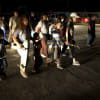
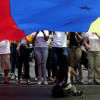
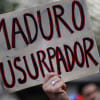
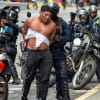


Comments